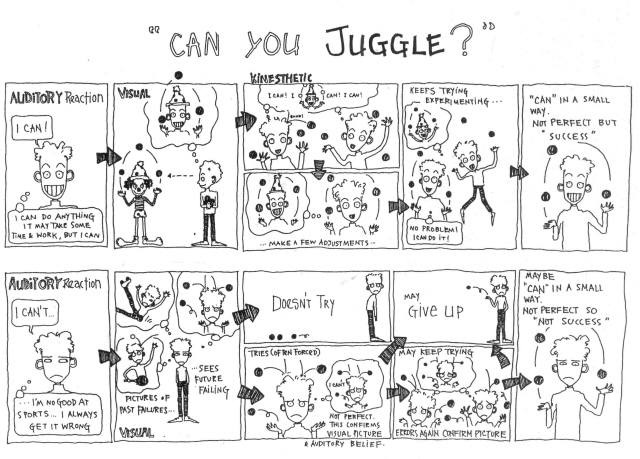 |
Page 39 Spring 1995
|
Learning level: You
have an approximate level of ability for whatever you try to learn.
When the materials, method, and learning partners can adjust to that
approximate level, it's easier for you to learn. In a classroom, it's
hard for one teacher to adjust to all the different levels at the same
time. Pairs working with each other usually do a much better job than
anyone teacher could do with 40 students. Advanced students working
with less advanced can still learn new things and learn the old things
even more deeply through teaching.
Steps: There
are steps, or simple chunks, that can help you learn. For some
learners the steps and chunks need to be smaller. Other learners can
jump steps and take bigger chunks. Time needed on certain steps will
usually vary among students. Of course, in juggling, starting with one
ball, then going to two, and then to three seem to be
self-evident.
However,
sometimes fast works better, especially when the conscious mind can be
diverted. I can get some novices to actually go twice around in less
than two minutes of quick steps if I distract their mind with my
banter and they don't consciously try to analyze what's going on. Its
as if their bodies already do know how, or can learn really quick, but
their mind thinks they can't unless they understand exactly what they
are doing. And when the conscious mind demands to know, it draws
attention to analysis and away from performance and can slow down what
the body is already capable of.
There
is also the possibility of going back to earlier steps when you need
to be more sure of yourself. Chunking is often left to the teacher,
when really you
Self-confidence: Thanks
to today's juggle, I could
have confidence for learning anything. So I think I will learn English
with this confidence after this. - (Naoyuki)
Succeeding
in juggling usually gives one a "Eureka!" effect. "I
did it!" increases one's self-confidence immensely. This of
course carries over to other things one is learning. Juggling also
allows you to notice other learning phenomena, such as the roller
coaster of progress, the inevitable ups and downs that we experience
in learning anything.
Reprogramming: For
my Japanese students who know how to toss and catch otedama, juggling
is really interesting, because it demands a bit of reprogramming as
there is some interference from a previous learning. It's very similar
to learning a new language which also comes with some interference
from your native language or previous languages. JUGGLING
MANGA Accompanying this article are some juggling manga (comics) that I usually give my students. As you look them over, figure out for yourself what are the beliefs, states and strategies of the two stereotypical characters. In which learning environments do you tend to resemble the top person, and in which do you tend to resemble the bottom.
Being
a good juggler, my bet is that you could use your own "automatic
mapping over" capabilities to use your powerful beliefs, states
and strategies in other areas of your lives - whether that be running
your business or learning a new skill.
In
the last frame the two boys do the exact same thing with the balls.
But the boy on the top calls what he does "success" while
the boy on the bottom calls what he does "failure." Words
and events and results do not have meaning, we give them meaning. And
the meaning we give them feed our future.
One
of the greatest advancements in human awareness has been the idea that
we are meaning-making and giving all the time and that we can decide
what meaning would be most productive to give in any situation. We can
self fulfill our prophecies.
I
leave you with one last student quote:
We
confirmed that BELIEFS
are important for
In my mind, if you are trying you are succeeding; you are. a juggler, a success, as soon as you dare to try. Or as my grandma was fond of saying, "A turtle trying to fly is more beautiful than a bird sitting in a tree." Tim
Murphey, Ph.D. is an associate professor at Nanzan University
and is the author of language teaching resource books
"Teaching One to One" (Longman 1991) and "Music
and Song" (Oxford University Press 1992). He teaches
Alternative Learning Forms, Neuro-Linguistic Programming and graduate
courses in interactive learning. He can be contacted at |
 |